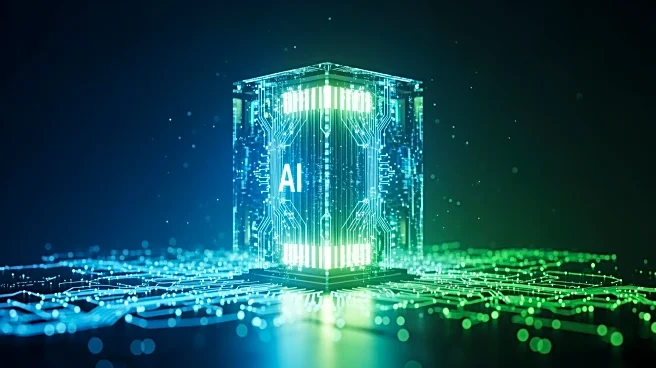What's Happening?
Bitcoin miners are increasingly turning to artificial intelligence (AI) and high-performance computing (HPC) to generate revenue as they face a challenging bear market. Seven of the top ten miners by hashrate
have already reported AI or HPC initiatives that are generating revenue, with others planning to follow. This shift is driven by the need to create a second line of business that competes with running ASICs at full power. Companies like TeraWulf and Core Scientific have signed significant hosting agreements to expand their AI capabilities. The economic case for this shift is supported by the predictability and contracted nature of AI hosting revenue, which is becoming a key feature for equity investors seeking steadier cash flows.
Why It's Important?
The move towards AI and HPC represents a significant shift in the business model of Bitcoin miners, who are traditionally reliant on cryptocurrency mining for revenue. This diversification is crucial as it provides a more stable and predictable revenue stream, reducing the reliance on volatile Bitcoin prices. The shift also highlights the growing demand for data-center power, with U.S. data-center electricity consumption projected to reach 606 TWh by 2030. This trend could lead to a realignment of the mining industry, with companies that successfully integrate AI and HPC potentially gaining a competitive edge. The broader impact includes potential changes in the composition of revenue for miners and a shift in investor focus towards contracted AI megawatts and dollars per MW per year.
What's Next?
As miners continue to integrate AI and HPC into their operations, the industry may see a slowdown in the expansion of network hashrate through 2026. This could result in a flatter growth curve compared to previous surges. However, high Bitcoin prices and fee spikes could still attract capital into mining. The focus will likely shift towards tracking contracted AI megawatts and utility capex plans, which will provide insights into how much mining power is being redirected to GPUs and how quickly new campuses are being energized.
Beyond the Headlines
The integration of AI and HPC into Bitcoin mining operations could have long-term implications for the industry. It may lead to a more sustainable and diversified business model, reducing the environmental impact of mining by optimizing energy use. Additionally, the shift could influence the global distribution of mining power, with companies in regions with abundant and cheap energy resources potentially gaining an advantage. The trend also raises questions about the future of cryptocurrency mining and its role in the broader tech ecosystem.











